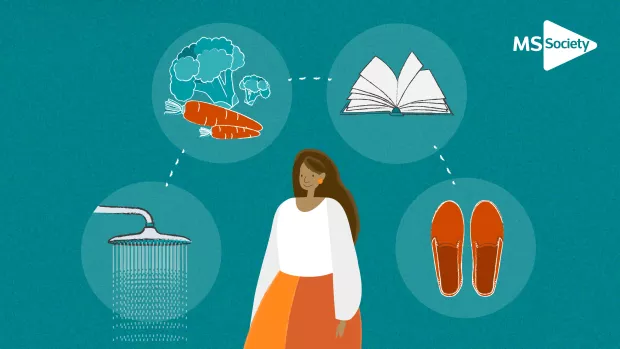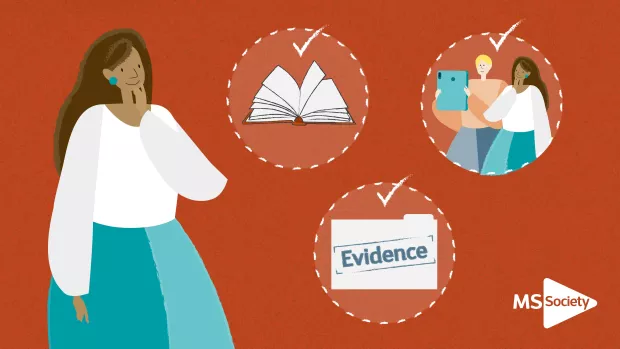
Personal Independence Payment (PIP)
Many people with MS can claim Personal Independence Payment (PIP). It's a benefit that can help cover the extra costs you may face if you need help doing everyday tasks or find it difficult to get around your home.
Who can claim PIP?
You can claim Personal Independence Payment (PIP) if you’re aged between 16 and the State Pension Age.
If you’ve reached State Pension Age and have care needs, you can claim Attendance Allowance instead. Children aged 15 or under with MS can claim DLA until they turn 16.
In Scotland, Adult Disability Payment is replacing PIP for most people. And in some parts of Scotland, under 18s can claim Child Disability Payment instead of DLA.
You can claim PIP once you have had problems with daily living or mobility for at least 3 months, and you expect those problems to continue for at least another 9 months.
You can get PIP even if:
- you are working
- you have not paid any National Insurance contributions
- you are getting other benefits, such as Universal Credit
- your partner or husband or wife works
- you have savings
- you live alone and no-one is providing care for you
- you already have someone, a partner for example, providing care for you
- you don’t want anyone to provide care for you
If you're unsure whether or not you qualify, call the claim line on 0800 917 2222 (textphone 0800 917 7777).
How much could I get with PIP?
How much you can get if you claim PIP depends on the level of your daily living needs or mobility problems.
PIP has 2 parts (known as components). You can be awarded either, or both, of these parts:
- a daily living component – for help with everyday life, for example dressing, eating, decision making
- a mobility component – for help with getting around, and this pays two diffrerent amounts: standard or enhanced rate
If you get PIP you might also be able to get extra money on top of some existing benefits and a reduction in council tax.
Find out more from Citizens Advice
You might also be able to access the Motability scheme if you’re claiming the enhanced rate of the mobility component of PIP.
Find out more on the Motability website
If you, your partner or child get PIP, the benefit cap won’t apply to your benefits. The benefit cap limits the total amount someone can get in benefits.
Disability Cost of Living Payment in 2023
If you've been getting PIP since at least 1 April 2023, you should have been paid the extra £150 Disability Cost of Living Payment. You'll also get it if you started a successful PIP claim before 1 April 2023.
It’s paid automatically and most people were paid in June or July 2023.
This one-off payment is tax free and it doesn't affect any other benefits.
Read the UK government advice for reporting a missing Cost of Living Payment
Making the application
Filling in the forms is quite complicated. If you can, get help from someone with a lot of experience with applying for PIP. A good place to turn to is an advice agency like Citizens Advice.
Our MS benefits advice service offers free, confidential advice to people affected by MS, supporting people in England, Wales, Northern Ireland and Scotland.
You can get in touch with our MS Benefits Adviser by calling the Helpline on 0808 800 8000 or emailing [email protected]
Your nearest MS Society group can also find you help with your application.
We've also got a free booklet you can download or order which takes you through claiming for PIP step-by-step, and how to challenge a decision if you need to. Read or order our Claiming Personal Independence Payment booklet
Applying for PIP: step-by-step
Start your claim
Call the claim line on 0800 917 2222 or textphone 08100 917 7777 (between 8am-6pm Monday to Friday). You'll be asked some basic information and you’ll get a letter to tell you if you qualify or not.
You qualify for PIP
You qualify and will receive the ‘How my disability affects me’ form.
You have one month to complete the ‘How my disability affects me’ form. The answers you give on this form will help the decision makers decide whether or not you get PIP.
Our Claiming Personal Independence Payment booklet includes a guide to filling in the form
If you don’t qualify, you’ll get a letter to tell you why. For support or help, you can contact local advice agencies like Citizens Advice.
Consultation - face-to-face, by video or phone
Once you’ve sent your form back, you’ll be contacted to arrange a consultation with a health care professional. You must be given at least 7 days’ notice of the time and place of the consultation.
It could be by phone, video call, or face-to-face. For a face-to-face assessment, most people have to go to an assessment centre. But if your GP usually sees you at home, you might be able to have the assessment at home instead.
What to expect
At the face-to-face consultation the health care professional will ask questions about your day-to-day life, your home, how you manage at work if you have a job, and about any social or leisure activities that you engage in (or have had to give up). They will often ask you to describe a typical day in your life.
When answering, explain your difficulties as fully as you can.
- Tell them about any pain or tiredness you feel, or would feel while carrying out each activity, and after you have carried it out
- Consider how you would feel if you had to do the same task repeatedly
- Tell them if you need reminding or encouraging to complete each activity
Don’t overestimate your ability to do things. If your condition varies, let them know about what you are like on bad days as well as good days. The health care professional’s opinion should not be based on a snapshot of your condition on the day of the consultation. They should consider the effects of your condition over time.
Before the consultation ends, the health care professional should give you an overview of their findings and invite you to ask questions and add or clarify anything you wish. You will not receive a formal decision at the consultation of whether you will be awarded PIP.
PIP not awarded
If your claim is turned down, you'll get a letter telling you why. The DWP will also usually call you to discuss this, but you can call the number on the letter if you’d like to talk the decision through before they do.
Are you unhappy about your PIP assessment or decision?
Our booklet Claiming Personal Independence Payment has information on challenging a decision
Contact our MS Helpline on 0808 800 8000 to speak to our Benefits Adviser about complaining or making an official appeal.
Our MS Helpline team can also help you find contact details for the organisations in charge of PIP assessments.
Ask for mandatory reconsideration
If you’re not happy with the decision you can ask for a 'mandatory reconsideration'. This means your case will be looked at again.
When requesting a mandatory reconsideration, you have the right to ask for copies of all the evidence that was used in making the decision. You can also ask them not to take any further action until you have had the chance to respond to that evidence.
If your PIP claim has been rejected you might also want to send a reconsideration letter to the DWP. The organisation AdviceNow has a tool available to help you write your letter.
If you are in any doubt about what might happen during a reconsideration, you can seek advice from a local advice centre, such as Citizens Advice, or call the MS Helpline on 0808 800 8000 and speak to our Benefits Adviser.
Appeal
If you’re not awarded PIP after the mandatory reconsideration and are still unhappy, you can appeal to an independent tribunal.
You have one calendar month from the date of the mandatory reconsideration notice to lodge an appeal to the HM Courts and Tribunal Service. The form you need is the SSCS1 – and the mandatory reconsideration notice will have details of how to get an SSCS1 form.
You’ll need to attach a copy of the mandatory reconsideration decision to your SSCS1 form before you send it off (you can only appeal once you’ve first asked for a mandatory reconsideration).
As well as giving details of the decision you’re appealing against, you must also make it clear why you disagree with the decision. Say what rate of PIP you consider you should have been awarded and your reasons for this.
PIP is awarded
If your claim is successful, you'll receive a letter telling you what rate of the PIP you'll get. The award will usually be set for a fixed period of time. This could be for a short period of 1 or 2 years, or a longer period of 5 or 10 years.
The award will only be for an indefinite period if you get the higher rate for both components, and if the case manager thinks it unlikely your condition will change in the future.
PIP reassessments for people over pension age
If you made a new claim for PIP after Friday 31 May 2019 and your award ends after you pass State Pension age you'll be given an ongoing award.
For example, if you were 62 years old at the time you made the claim, and it's decided your award should be for 5 years, this means your award will end after the State Pension age. You'll instead get an ongoing award. If it's decided your award will only be for 2 years, you'll still need to have another assessment as you'll still be under the pension age.
If your needs change after you get an ongoing award, you'll still be able to ask for another assessment by contacting the DWP, regardless of how old you are at the time.
The state pension age is slowly going up from 65. Find what your state pension age will be by using the pension age calculator on the gov.uk website or calling the Future Pension Centre on 0345 3000 168.
Last full review:
We also update when we know about important changes.



